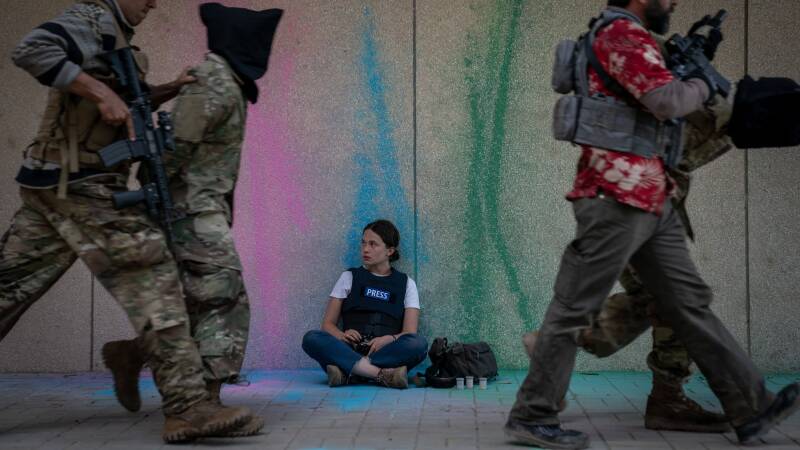
Alex Garland's "Civil War" isn't your typical war film. Forget sprawling battles and heroic charges. This is a harrowing and unflinching portrait of a fractured America.
Garland's world-building is nothing short of masterful. We follow a group of journalists on a desperate road trip, traversing a wasteland of a nation. Every mile traveled unveils a deeper scar on the American landscape, a testament to the relentless conflict. This isn't just a backdrop; America itself becomes the central character, its decay reflecting the moral rot that fuels the war.
The cinematography by Rob Hardy is a marvel. Stunning visuals belie the underlying horror, a twisted beauty that underscores our desensitization to violence.
The true power of "Civil War" lies in its anti-war message. The film doesn't preach; it screams out in agony. The relentless violence, the ever-present threat, the hollowness in the characters' eyes – it's a symphony of despair. Every thunderous bullet from the incredible sound design feels like a plea for peace, every explosion a searing indictment of war's inhumanity.
This is not a film for the faint of heart. Garland pulls no punches. The dehumanization of the conflict is laid bare, with violence depicted in a way that is both brutal and strangely numbing. It's a reflection of how war itself can numb us, a chilling commentary on how easily we become accustomed to the horrific.
The film hinges on the performances of Cailee Spaeny and Kirsten Dunst. Spaeny's Jessie is a young journalist, wide-eyed and idealistic. But as the war grinds on, her innocence is shattered, leaving a hardened cynicism reminiscent of Nightcrawler's Lou Bloom.
Dunst's Lee, meanwhile, embodies the weariness of a seasoned war correspondent. Years of exposure to violence have left her emotionally exhausted, questioning the purpose of her relentless pursuit of the truth. Their journeys are a microcosm of the film's message – a descent into moral ambiguity and despair.
In a brief but anxiety-inducing scene, Plemons delivers a chilling performance as a ruthless militia soldier. With minimal dialogue and a menacing intensity, he embodies the dangers of unchecked violence and extremism. His five minutes of screen time are some of the most riveting and tense of the year, a powerful microcosm of the film's larger anti-war message.
The film's haunting score by Garland's trusted long-term collaborators, Geoff Barrow and Ben Salisbury, complements the brutality with a unique blend of synthetic and organic sounds. Discordant and unsettling, it mirrors the fractured nation, but flickers with moments of fragile beauty, a testament to humanity's enduring spirit. It's not just background music; it's a gut punch.
The dissonant soundtrack, reminiscent of Apocalypse Now, adds another layer of brilliance. High tempo songs that make your body want to bop juxtaposed against scenes of devastation further emphasize our desensitization. We've become accustomed to the soundtrack of war, a chilling commentary on our warped perception of conflict.
"Civil War" is a film that will stay with you long after the credits roll. It's a challenging watch, but a necessary one. It's a stark warning, a desperate plea for sanity amidst the chaos. This isn't just a story about war; it's a wake-up call for humanity itself.
9/10
Add comment
Comments